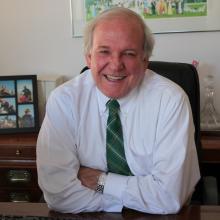Faith
DEALING WITH IRAN is complex for many reasons. This is not a made-up country whose borders were dictated by politicians in the last century; it is Persia—the great empire that fought with Greece before the beginning of the Christian era, the Asiatic power that imperial Rome was never totally able to subdue. From that long history emerged a people with a deep sense of proud history and a realization of national sovereignty that helps guide the destiny of the nation and its peoples.
I recall a conversation years ago with then-Iranian President Mohammad Khatami about nuclear power. He was not in favor of creating weapons of mass destruction, but he clearly promoted Iran’s right to develop nuclear energy for peaceful purposes. To deny this right is an affront to national sovereignty, he argued.
After the unfortunate history of the past government, once again Iran is governed by a president and a cabinet that call for peaceful nuclear development and for a new and more open relationship with the West. This is the fact that has emerged into a clear interim agreement between the so-called P5+1—the members of the U.N. Security Council plus Germany—and Iran. As reported, the goal of ongoing negotiations is to open the door to a 24/7 inspection of nuclear facilities and other guarantees to ensure that Iran will not make nuclear weapons.
The fact that the new president and his foreign minister are talking with the United Nations, and with Western leaders in particular, gives the world a better check on the nuclear ambitions of Iran than we have on any other nation in the region that stretches from the Mediterranean to the Indian Ocean. If in the terrible, and most unlikely, event that a government of Iran should change its position and decide to build a nuclear weapon, the world would know almost immediately because of the security and surveillance that are likely to be part of a permanent agreement. In such an eventuality, it would be possible to reinstitute the former sanctions or even impose more stringent ones.
I grew up with music in my life. At first, it was a combination of my dad’s Willie Nelson and Ray Charles with my mom’s old southern Gospel hymns. I’d sit under the piano, feeling the vibrations as she played “Blessed Assurance,” and then lie on the floor in front of the speakers as Ike and Tina belted out “Proud Mary.”
And then I discovered my own music, in the form of rock. Eventually, I sang lead in several hard rock bands around Dallas hitting all the local hot spots and singing until I was hoarse and exhausted. It was during my decade away from church that I did most of this, but I didn’t realize until recently that, despite the pretense of countercultural rebellion the music offered, it actually gave me some of the same things I experienced as part of organized religion.
Of course, only the most uneducated would think of rock music as some monolithic think that was barely held together by the pursuit of sex, drugs, and fame. There were rules. There were codes. And my lord, there were categories.
Any time you asked a band what style they were, inevitably they’d sigh and equivocate, finally listing off a handful of bands they most certainly were not like. No one wanted to be categorized, and yet we were more than ready to label all others and fit them in to their neat little musical denominations.
“Christianity” is often used to manipulate, control, shame, judge, and hurt others. It’s influenced by politics, popularity, wealth, success, pride, hate, fear, selfishness, and a desire for power. The poisoning of our beliefs — or theology — happens subtly, under the pretense of tradition, teaching, education, discipline, authority, respect, and religion.
We often treat theology similar to politics, where our beliefs and doctrines are based on which ones benefit us the most.
We strive to get everything we can from our faith, and this can lead to spiritual narcissism, where we become obsessed with maximizing the benefits for ourselves while withholding them from others.
Rarely do we adhere to — or agree with — theological ideas that benefit someone else more than us. Sacrificing our own comforts for the sake of others is absurd — which leads to a sense of divine favoritism.
One night after working a college basketball game, I stopped to use the restroom before heading out of the arena and making the drive home. I pushed on the heavy, gray door and found that it was locked.
Uh-oh. This isn’t good.
Neither were my options.
I could wander around the arena hoping to find an unlocked restroom; they might all be locked by now. I could try to make it home — probably wouldn’t work. As I stood in front of the locked door trying to decide what to do, I heard a woman’s voice from down the hall.
Millennials are the worst generation ever, a recent study by the Pew Research Center confirmed. The other generations already knew that, of course, but the study has given them new insights into what characterizes me and my fellow Millennials beyond “They freaking love Starbucks” and “They refuse to move out of my basement.”
The study’s revelations include that we’re not making all that much money, we have tons of debt, we’re racially diverse, and we use the Internet a lot (curiously absent was the fact that 97 percent of us do not like being broadly defined or labeled or otherwise demographed). We also tend to shun institutions, including religious ones, at rates far surpassing our parents and grandparents.
This last little detail has not escaped the notice of conservative media outlets, whose reactions have ranged from cautious reserved judgment to something bordering on full-blown alarm.
Like a true Millennial, I don’t think things are all that bad (heck, I wouldn’t know where the panic button is even if I wanted to press it). Actually, as a Christian, I think there is a lot to be excited about in the generation that’s poised to inherit the world … after we move out of our parents’ houses, that is.
“Public theology is the way in which faith professes action in the public square,” explained Mike McCurry.
This idea — that there is a connection between your spiritual faith and what you do in politics — is an underlying theme in McCurry’s journey from press secretary for former President Bill Clinton to joining the faculty at Wesley Theological Seminary in Washington, D.C., as professor of public theology.
Everywhere we turn, someone or something is vying for our allegiance. Sports teams. Car companies. Television networks. Politicians. Political parties. Flags. Countries. And of course, the church. Many of us will readily admit that Jesus taught our allegiance is to be, first and foremost, to God. That is, until someone steps on our toes and throws our church into the mix. For many, their allegiance to God and their church are so intertwined it's difficult to tell where one ends and the other begins. But what does Jesus have to say about all of this?
From my estimation, God makes it pretty clear that he does not want to vie for our allegiance. Isn't that the whole point of the first commandment? Jump ahead to the New Testament and we find Jesus teaching the same thing. At one point Jesus goes so far as to tell us that our allegiance cannot be divided. Either we will love the one and hate the other, or hate the one and love the other. According to Jesus, serving two masters isn't just difficult, it's impossible. To further illustrate this point, he even turns away a would be disciple. From reading the story, this man seems to have a legitimate concern. All he wants to do is bury his father before taking off to follow in the footsteps of this rabbi. But from Jesus' perspective, his allegiance is divided, so this won't fly.
Today is no different. God doesn't want to vie for our allegiance. Yet he must, because our allegiance is divided between church attendance, theological stances, and denominational commitments (among other things), as if these things take precedence over following Jesus.







